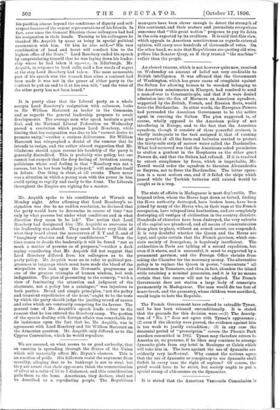Mr. Asquith spoke to his constituents at Wormit on Monday
night. After affirming that Lord Rosebery's re- signation was due to no sudden resolution, he declared that the party would have to determine in course of time "not only by what persons but under what conditions and in what direction they mean to be led." The notion that Lord Rosebery had designated him (Hr. Asquith) as successor to the leadership was absurd. They must believe very little of what they heard about the mancenvres of X Y and Z, and of "imaginary rivalries and fancy candidatures." When the time comes to decide the leadership it will be found "not so much a matter of persons as of purposes,"—rather a dark saying considering that Mr. Asquith did not suggest that Lord Rosebery differed from his colleagues as to the party policy. Mr. Asquith went on to refer to political pro- grammes in language which must have made the blood of the wirepullers who look upon the Newcastle programme as one of the greatest triumphs of human wisdom, boil with indignation. The plan of presenting to the country, "with a view of fascinating the attention and judgment of the electorate, not a policy but a catalogue," was injurious to both parties. Broad and simple principles, "not the paltry and transient expediencies of the hour," ought to be the tests by which the party should judge the jostling crowd of causes and cries which are constantly competing for its favour. The general tone of Mr. Asquith's speech lends co/our to the rumour that he has entered the Rosebery camp. The portion of the speech dealing with foreign affairs was remarkable for its insistence upon the fact that he, Mr. Asquith, was in agreement with Lord Rosebery and Sir William Harcourt on the Armenian question. Mr. Asquith only differed as to the Cyprus Convention, which he would repudiate.






































 Previous page
Previous page